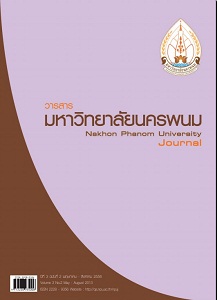การเปรียบเทียบผลสัมฤทธิ์ทางการเรียนรู้ ทักษะกระบวนการทางวิทยาศาสตร์ และความสามารถในการคิดวิเคราะห์ ของนักเรียนชั้นมัธยมศึกษาปีที่ 1 เรื่อง สารและสมบัติของสารระหว่างการจัดกิจกรรมการเรียนรู้ตาม รูปแบบวัฏจักรการเรียนรู้ 7E และรูปแบบ CIPPA
Main Article Content
Abstract
การวิจัยครั้งนี้มีวัตถุประสงค์เพื่อ 1) เปรียบเทียบผลสัมฤทธิ์การเรียนรู้ ของนักเรียนระดับชั้นมัธยมศึกษาปีที่ 1 เรื่อง สารและ สมบัติของสาร ระหว่างการจัดกิจกรรมการเรียนรู้ตามรูปแบบวัฏจักรการเรียนรู้ 7E และรูปแบบ CIPPA 2) เปรียบเทียบทักษะ กระบวนการทางวิทยาศาสตร์ ของนักเรียนระดับชั้นมัธยมศึกษาปีที่ 1 เรื่อง สารและสมบัติของสาร ระหว่างการจัดกิจกรรมการเรียนรู้ ตามรูปแบบวัฏจักรการเรียนรู้ 7E และรูปแบบ CIPPA 3) เปรียบเทียบความสามารถใน การคิดวิเคราะห์ของนักเรียนระดับชั้น มัธยมศึกษาปีที่ 1 เรื่อง สารและสมบัติของสาร ระหว่างการจัดกิจกรรมการเรียนรู้ ตามรูปแบบวัฏจักรการเรียนรู้ 7E และรูปแบบ CIPPA ประชากร ได้แก่ นักเรียนชั้นมัธยมศึกษาปีที่ 1 ภาคเรียนที่ 1 ปีการศึกษา 2554 โรงเรียนนาแกสามัคคีวิทยา อำเภอนาแก จังหวัดนครพนม จำนวน 11 ห้องเรียน นักเรียน จำนวน 380 คน กลุ่มตัวอย่างได้จากการสุ่มแบบกลุ่ม (Cluster Random Sampling) ได้แก่ นักเรียนชั้นมัธยมศึกษาปีที่ 1/1 จำนวน 31 คน ใช้การจัดกิจกรรมการเรียนรู้ตามรูปแบบวัฏจักรการเรียนรู้ 7E และนักเรียน ชั้นมัธยมศึกษาปีที่ 1/2 จำนวน 31 คน ใช้การจัดกิจกรรมการเรียนรู้ตามรูปแบบ CIPPA เครื่องมือที่ใช้ในการทดลองได้แก่ แผนการจัด กิจกรรมการเรียนรู้ตามรูปแบบวัฏจักรการเรียนรู้ 7E และรูปแบบ CIPPA จำนวนแบบละ 11 แผนๆ ละ 1–2 ชั่วโมง รวมเวลา 17 ชั่วโมง เครื่องมือที่ใช้ในการเก็บรวบรวมข้อมูล ได้แก่ แบบทดสอบผลสัมฤทธิ์ทางการเรียนรู้ จำนวน 40 ข้อ ค่าความเชื่อมั่นทั้งฉบับ (r) เท่ากับ 0.96 แบบทดสอบทักษะกระบวนการทางวิทยาศาสตร์ จำนวน 30 ข้อ ค่าความเชื่อมั่นทั้งฉบับ (KR-20) เท่ากับ 0.94 แบบทดสอบการคิดวิเคราะห์ จำนวน 30 ข้อ มีค่าความเชื่อมั่นทั้งฉบับ (KR-20) เท่ากับ 0.94 สถิติที่ใช้ในการวิเคราะห์ข้อมูล ได้แก่ ค่าเฉลี่ย () ส่วนเบี่ยงเบนมาตรฐาน (S.D) และสถิติทดสอบที (t–test) ผลการวิจัยพบว่า ผลสัมฤทธิ์ทางการเรียนรู้ ทักษะกระบวนการ ทางวิทยาศาสตร์ และความสามารถในการคิดวิเคราะห์ของนักเรียนชั้นมัธยมศึกษาปีที่ 1 เรื่อง สารและสมบัติของสาร ที่ได้รับการเรียนรู้ จากการจัดกิจกรรมการเรียนรู้ตามรูปแบบวัฏจักรการเรียนรู้ 7E และรูปแบบ CIPPA ไม่แตกต่างกัน
The purposes of this study were to: 1) compare learning achievements of MathayomSuksa 1 students on the subject of substances and their properties by management of learning activities using the 7E Learning Cycle versus the CIPPA Model, 2) compare science process skills of MathayomSuksa 1students on the subject of substances and their properties by management of learning activities using the 7E Learning Cycle versus the CIPPA Model, 3) compare analytical thinking abilities of Mathayom Susa 1 students on the subject of substances and their properties by management of learning activities using the 7E Learning Cycle versus the CIPPA Model. The population was 380 Mathayom-Suksa-1 students in 11 classes enrolled in the first semester of academic year 2011 at NakaeSamakkhiWithaya School, Nakae district, NakhonPhanom province. The sample of 31 MathayomSuksa 1/room 1 students deriving from cluster random sampling was given learning activities using the 7E Learning Cycle, while the other 31 MathayomSuksa 1/room 2 students were given learning activities using the CIPPA Model. Each plan consumed 1-2 hours totaling 17 hours for each treatment. The tools for collecting data were a 40-item test of learning achievement whose entire reliability coefficient was 0.96, a 30-item test of science process skill whose entire reliability coefficient was 0.94 and a 30-item test of analytical thinking ability whose entire reliability coefficient was 0.94. Statistics used to analyze data were mean, standard deviation, and t-test. The findings revealed that learning achievements, science process skills and analytical thinking abilities of MathayomSuksa 1 students on the subject of substances and their properties by management of learning activities through the 7E Learning Cycle versus the CIPPA Model were not found different.


